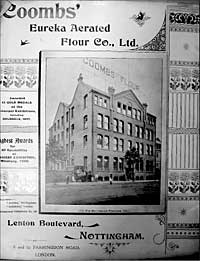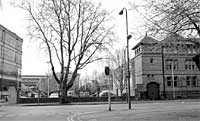Articles from the Thoroton Society Newsletter
Coombs' 'Eureka' Aerated Flour Company Ltd – A Nottingham business
By John Wilson

Advert from Nottingham and Notts Illustrated.
This company was set up by a Mr. W. A. Coombs in 1885 in premises in St. Ann’s Well Road and sold flour in convenient paper bags. Business was initially brisk, and in 1890 the company moved to larger premises in Stanford Street. Also in 1890, the company became Coombs’ ‘Eureka’ Aerated Flour Company Ltd., with Mr. Coombs as managing director. Other directors of the company included Mr. Joseph Peck, the Company Chairman, Mr. J. W. Hodges and Mr. D. Y. Lorimer, all gentlemen of tried commercial ability and possessed of lengthy practical experience in the trade they have so emphatically made their own.
The business grew to such an extent that in 1895 the firm moved to a purpose-built five-storey factory in Lenton Boulevard (which became Castle Boulevard in about 1906). The factory was at the foot of the Castle Rock, the canal forming the Southern boundary. It was a very modern factory, with every provision for the comfort and convenience of the [largely] female staff, including a comfortable mess room with dressing room and a large room for recreation and instruction. Every floor of the factory has lavatories of the most up-to-date description. There was good light, perfect ventilation and scrupulous cleanliness. Trade was so good that the company also opened a London office and warehouse at 8 and 8a Farringdon Road, with Mr. Lorimer as director of the London operation.
The company’s main product, their ‘Eureka’ Aerated Pastry Flour, was manufactured to a very high standard. The flour was mixed at least 120 times before packing in order to aerate it. However, a secret ingredient was also added during the mixing process (possibly baking powder). The purpose of the mixing and the secret ingredient was to produce very light pastry, which would not give indigestion to those eating it. There were numerous testimonies to the quality of the flour, including one from the Borough Analyst for Nottingham, Edgar B. Truman, Esq. M.D., who declared that I have made an analysis of Coombs’ Aerated Flour, and find it consists of the best wheat flour, with a perfectly innocuous substance added for the purpose of making the Pastry light and digestible. It contains no alum or other adulteration.
A testimonial from Mr. J. Sharcy, Purveyor to HRH the Prince of Wales, in 1886 states I have given the Aerated Flour a thorough trial in both cakes and pastry. I consider it perfectly wholesome and it makes the pastry short and the cakes light, and very agreeable to the taste.
Coombs branched out into other products, including custard powder, a rich high-class dainty; Blanc mange in various flavours; Egg powder, a substitute for eggs and Lady Cake Flour. The company also acquired the selling rights to Farrar’s Isobel Pastry Roller (one was sold recently on eBay for £90).
Coombs were awarded numerous medals at exhibitions, including a gold medal at a Cookery Exhibition at the Imperial Institute in London in 1896, and a Gold at the Brussels International Exhibition of 1897.
But – all was not well. A notice in the London Gazette of 14 December 1909 stated Notice is hereby given ... that the capital of the company be reduced from £25,000 to £11,666. 13s. 4d. It is possible that the company never recovered financially from the cost of building their Lenton Boulevard factory.
Finally, in 1913, the London Gazette of 15 August announced in the matter of the Companies (Consolidation) Act 1908 and of COOMBS’ ‘EUREKA’ AERATED FLOUR COMPANY Limited (in voluntary liquidation) Notice is hereby given that a general Meeting of the above named company will be held at 2, St. Peter’s Church Walk, Nottingham on Wednesday the 17th day of September 1913 at 11 o’clock in the forenoon, for the purpose of having the liquidator’s accounts, showing the manner in which the winding-up has been conducted and the property of the Company disposed of, laid before such meeting, and of hearing any explanation that may be given by the Liquidator, and also of determining, by Extraordinary Resolution, the manner in which the books, accounts and documents of the Company and of the Liquidator thereof, shall be disposed of.
Dated this 6th day of August 1913. Arthur J. Chamberlain, liquidator.
It appears, from the Wright’s Directory of 1914, that the premises were sold or let to the Aerated Flour and Specialities Company. An advertisement in the Nottingham Evening Post on 2 April 1914 offered free flour. Look out for the coupon entitling to two 3p bags of flour for the price of one. An early example of BOGOF?

The factory site in April 2013. Photo by Paul Malon.
By 1915, the premises were occupied by the Forget-Me-Not Flour Company, manufacturers of self-raising flour and by 1920, John Franks and Co. Ltd., Wholesale grocers, occupied the site. The factory is no longer standing.
Sources:
Nottingham and Notts Illustrated
Wright’s Directories of Nottingham (various)
London Gazette (accessed by internet)
Also consulted: www.nottshistory.org.uk
< Previous